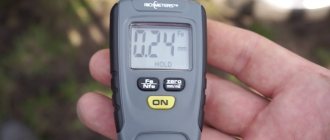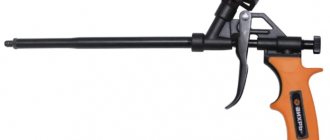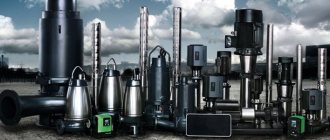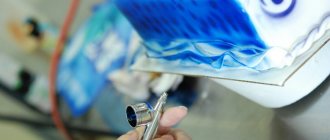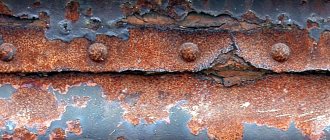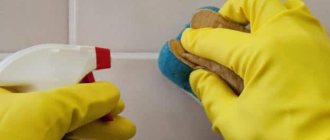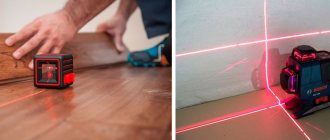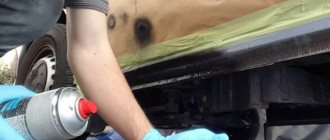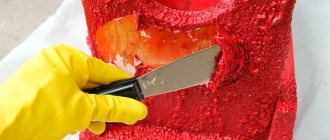Thickness gauge - a device that allows you to determine the thickness of a metallic or non-metallic material with high accuracy.
Compact electronic devices of this type will help you avoid problems when buying a car and will be useful at a construction site or when constructing something .
What features of thickness gauges should you pay attention to before purchasing, and which model to choose for household and professional use, we will consider in this collection.
Page navigation:
Criteria for choosing a thickness gauge
Modern equipment for measuring material thickness has a built-in/remote sensor, a digital display, and autonomous power supply.
When choosing a thickness gauge, you should pay attention to a number of important parameters:
- Principle of measurement. There are several types of devices with different operating principles. Electromagnetic thickness gauges only work with magnetic metal surfaces. Eddy current devices are capable of determining the thickness of any (including non-ferrous) metal. Ultrasonic devices can measure virtually all materials, including metal, plastic and wood.
- Accuracy of readings. This parameter determines the amount of error with which the measurement is made. An error of 1-2 percent ensures sufficient measurement accuracy. Coarser instruments are used to roughly estimate the thickness of a material or coating.
- Measuring range. Modern electronic equipment allows you to work with materials up to 1800-3000 microns thick. This is enough to measure, for example, the paintwork of a car. The higher the value, the more versatile the device can be used.
- Calibration method. Devices with auto-calibration are easy to use; the user is not required to perform any complex actions. Manual calibration is in demand by professionals - it is a fairly long process using special films and entering the exact values of the measured surfaces.
- Power supply. Modern portable thickness gauges can be powered by batteries or rechargeable batteries; some models support connection with mobile devices. Rechargeable devices require periodic recharging, equipment with batteries require replacement of dead energy sources.
- Additional features. Various useful options increase the functionality of the device. This includes automatic shutdown to preserve battery charge, waterproof design to protect electronics from moisture, built-in memory to save measurement results, real-time coverage scanning and other features.
Tips and tricks
What conclusions can be drawn when obtaining data after measurements? When the thickness of the paint layer on the fenders of a car is 100, on the hood 140, and on the doors 120, there is no need to be afraid. Such deviations are quite acceptable and are often observed even on a new car. But a spread of 50-80% or more indicates that the car has been painted, which means it has been in an accident. In this case, you need to conduct a more detailed analysis at a service station, paying for diagnostics. This will help avoid serious problems and costs in the future.
The best thickness gauges in price/quality ratio
The presented devices are equipped with a modern technological base that ensures fairly high measurement accuracy.
Rating of the TOP 3 best thickness gauges in terms of price and quality ratio.
CarSys DPM-816E Lite (Fe/nFe)
The CarSys DPM-816E Lite (Fe/nFe) model is a lightweight version of the popular thickness gauge with the Pro prefix; the device uses a combined measuring principle and provides high accuracy of readings.
The device has a low error and is stable when taking measurements at one point.
The device can be used at low temperatures. Its response speed does not exceed 1 second, and there is stabilization of the sensor clamping force.
The thickness gauge provides coating measurements from 0 to 2 mm.
The option to automatically detect the moment of measurement allows you to avoid false alarms. The device is equipped with an auto power off system and has two operating modes.
Specifications:
- measurement principle - combined;
- testing accuracy - 2%;
- maximum thickness - 2000 microns;
- device calibration is automatic;
- power supply - AAA batteries;
- overall dimensions - 104x43x29 mm;
- device weight - 50 g;
- Features: Auto power off, sound signal.
Advantages
- ease of use;
- affordable price;
- good accuracy;
- compact sizes.
Flaws
- lack of backlight;
- not rich equipment;
- long response.
CarSys DPM-816 PRO (Fe/nFe)
Thickness gauge CarSys DPM-816 PRO (Fe/nFe) is a professional, low-temperature-resistant model for accurate and stable measurement of metal thickness.
The device has a low response speed - the value does not exceed 1 second.
The device is equipped with a soft display backlight. Its measurement range is 0-3mm.
The device can operate at temperatures from -25 to 40 degrees.
The presented thickness gauge can automatically detect the base, recognizes galvanized surfaces, is provided with an audible signal and stabilizes the clamping force of the sensor.
Specifications:
- measurement principle - combined;
- testing accuracy - 1%;
- maximum thickness - 3000 microns;
- device calibration is automatic;
- power supply - AAA batteries;
- overall dimensions - 104x43x29 mm;
- device weight - 50 g;
- Features: Auto power off, sound signal.
Advantages
- compactness;
- affordable price;
- fast measurement;
- light weight.
Flaws
- not an ergonomic model;
- no cover included;
- rapid battery drain.
MEGEON 19200
The compact device MEGEON 19200, operating using the principle of magnetic induction, will provide fast and accurate measurement of coating thickness on ferrous or non-ferrous metal surfaces.
The equipment is equipped with an informative LCD display with current data output, and an ergonomic housing made of high-quality plastic.
The thickness gauge has a fast response time - the value is only 0.15 seconds.
The device is characterized by a wide measurement range from 0 to 1.8 mm.
The product is equipped with screen backlighting, AAA batteries and calibration films.
Specifications:
- measurement principle - magnetic-inductive;
- testing accuracy - 1%;
- maximum thickness - 1800 microns;
- device calibration - manual;
- power supply - AAA batteries;
- overall dimensions - 62×105×31 mm;
- device weight - 64 g;
- Features: continuous metering, auto power off, display backlight.
Advantages
- fast response;
- informative sound indication;
- affordable price tag;
- possibility of continuous measurement.
Flaws
- not ideal build quality;
- requires manual calibration;
- sensitive to temperature and humidity.
The best inexpensive models
Budget thickness gauges, which are entry-level devices, are best suited for domestic use.
Xiaomi Duka CH-1
The affordable Xiaomi Duka CH-1 ultrasonic thickness gauge, equipped with standard and additional functionality, will help you quickly and accurately determine the thickness of a vehicle’s paintwork.
The device automatically determines the substrate material and is capable of detecting the thickness of paint, paper and film.
The device is characterized by ease of operation, small errors, high reliability and stability. Low power consumption LCD display provides clear display of current data.
The ergonomic body of the device is made of high quality plastic. The product weighs 73 grams.
Specifications:
- measurement principle: ultrasonic;
- testing accuracy - 1%;
- maximum thickness - 1800 microns;
- device calibration is automatic;
- power supply - AAA batteries;
- overall dimensions - 108x62x27 mm;
- device weight - 73 g;
- features - additional software options.
Advantages
- ease of use;
- reliability of design;
- light weight;
- accuracy of measurements;
- affordable price.
Flaws
- does not show in microns;
- basic functionality;
- not bright screen.
BENETECH GM200A
A universal electronic device with an LCD display BENETECH GM200A will allow you to measure the thickness of the paint coating and help detect defects and traces of body repairs that are invisible during external inspection.
The thickness gauge does not require manual calibration and works with magnetic and non-magnetic metals.
The model supports three operating modes - single, constant and differential.
Its ergonomic body is made of high quality plastic.
There is a possibility of continuous measurement (scanning mode). The automatic shut-off feature saves power on power supplies.
Specifications:
- measurement principle - combined;
- testing accuracy - 0.5%;
- maximum thickness - 2000 microns;
- device calibration is automatic;
- power supply - AAA batteries;
- overall dimensions - 105×60×27 mm;
- device weight - 58 g;
- Features: continuous metering, auto shut-off, charge indicator.
Advantages
- ergonomics;
- accuracy of measurements;
- three operating modes;
- low battery indication.
Flaws
- not ideal build quality;
- long response;
- quiet signal.
Yunombo YNB-100
The inexpensive automatic model Yunombo YNB-100 with a combined operating principle is designed for measuring the thickness of paint coatings on magnetic and non-magnetic metals such as steel, aluminum and copper.
The thickness gauge has basic functionality. The device supports automatic calibration mode, its error does not exceed 1 percent.
The device provides readings on an informative backlit display.
The measurement range in this model is 0-1.8 mm.
The product is assembled in a compact and ergonomic plastic case and is equipped with everything necessary for work.
Specifications:
- measurement principle - combined;
- testing accuracy - 1%;
- maximum thickness - 1800 microns;
- device calibration is automatic;
- power supply - CR2032 elements;
- overall dimensions - 35×83×22 mm;
- device weight - 64 g;
- Features: Auto power off, display backlight.
Advantages
- ergonomics of the device;
- compact dimensions;
- sufficient accuracy;
- low cost.
Flaws
- poor equipment;
- basic functionality;
- dim lighting.
The best professional devices
Advanced models of thickness gauges will allow you to work with materials and coatings with increased comfort and precision .
Etari ET 555
The combined thickness gauge Etari ET 555 is a professional model with an ergonomic body, automatic calibration function, a powerful processor and a UV flashlight.
The presented device can be used at ambient temperatures from -25 to 50 degrees.
The device is characterized by stability, good autonomy, and a wide measurement range.
The device allows you to take measurements of materials with a thickness of 0-2 mm, the product is equipped with an informative 4-inch backlit display and automatic shutdown.
Advanced electronic components ensure high-speed data processing and low power consumption of equipment.
Specifications:
- measurement principle - combined;
- testing accuracy - 5%;
- maximum thickness - 2000 microns;
- device calibration is automatic;
- power supply - AAA batteries;
- overall dimensions - 120x52x25 mm;
- device weight - 100 g;
- Features: display backlight, auto power off, LED/UV flashlight.
Advantages
- excellent workmanship;
- compact dimensions;
- fast reaction;
- functionality;
- autonomy.
Flaws
- inflated price tag;
- no cover included.
RGK TM-17
The eddy current high-precision measuring device RGK TM-17 will help determine the thickness of the coating on various materials with recording the measurement results in the built-in memory.
The thickness gauge stores up to 30 values.
The received data is displayed on a 2-inch LCD display with a spatial orientation option - the image on the screen can be rotated depending on the position of the device.
The equipment is equipped with a sound sensor that is triggered when minimum or maximum values that can be set by the user are exceeded.
The manual calibration option allows you to fine-tune the device. The measurement range of the presented device is 0-1.7 mm.
Specifications:
- measurement principle - eddy current;
- testing accuracy - 2.5%;
- maximum thickness - 1700 microns;
- device calibration - manual;
- power supply - AAA batteries;
- overall dimensions - 52×120×26 mm;
- device weight - 500 g;
- Features: continuous measurement, sound signal, auto shut-off, memory for 30 readings.
Advantages
- accuracy of measurements;
- ease of use;
- versatility;
- fast response;
- convenient scanning mode.
Flaws
- rapid battery discharge;
- high price tag.
Smart Test T-500
A compact, professional-grade device, Smart Test T-500 is a modern thickness gauge for ferrous and non-ferrous metals such as iron, aluminum and galvanized steel.
The equipment is equipped with a wear-resistant metal measuring sensor.
Calibration plates and washers allow you to manually adjust the device with high precision.
The convenient included fabric case is useful for carrying and storing the device.
The product operates on two AAA batteries, has a low accuracy, and is equipped with an audible alarm and a UV flashlight for checking VIN.
Also included are calibration films for 50, 100, 250, 500 and 1000 microns.
Specifications:
- measurement principle - eddy current;
- testing accuracy - 3%;
- maximum thickness - 1500 microns;
- device calibration - manual;
- power supply - AAA batteries;
- overall dimensions - 53x26x112mm;
- device weight - 102 g;
- Features: continuous metering, sound signal, UV flashlight.
Advantages
- good equipment;
- ergonomic design;
- instant response;
- UV flashlight.
Flaws
- high price;
- measurement error;
- no self-tuning.
rDevice RD-1000 Pro (Fe/nFe), ruby sensor, cases, 2 mm
The rDevice RD-1000 Pro (Fe/nFe) model, equipped with a ruby sensor and equipped with two cases, will allow you to measure the thickness of materials up to 2 mm with high accuracy and speed.
The equipment ensures stability of readings at ambient temperatures from -15 to 50 degrees.
Short-term use of the device is allowed at -25 degrees.
The device allows you to take up to 120 measurements per minute with an error of 2 percent, supports self-calibration, and its display is equipped with a bright backlight.
The ruby sensor installed on board practically does not wear out over time.
Specifications:
- measurement principle - electromagnetic;
- testing accuracy - 2%;
- maximum thickness - 2000 microns;
- device calibration is automatic;
- power supply - AAA batteries;
- overall dimensions - 103x62x27mm;
- device weight - 83 g;
- Features: continuous metering, sound signal, auto power off, ruby sensor, display backlight.
Advantages
- high speed;
- accuracy of measurements;
- compactness;
- ease of use.
Flaws
- easily soiled covers;
- high price.
Etari ET 600
The combined model Etari ET 600 is a professional-grade thickness gauge that provides fast and accurate measurement of the paint layer on ferrous and non-ferrous metal surfaces.
The equipment is equipped with automatic calibration, a large LCD display with auto-backlight, and a built-in memory chip for saving and viewing measurement results at any time.
With such a serious filling, the thickness gauge weighs only 75 g, and with two AAA batteries - about 100 g.
The product operates reliably and stably in a wide range of ambient temperatures from -20 to 50 degrees.
Specifications:
- measurement principle - combined;
- testing accuracy - 3%;
- maximum thickness - 1500 microns;
- device calibration is automatic;
- power supply - AAA batteries;
- overall dimensions - 120x52x25 mm;
- device weight - 75 g;
- Features: memory for 20 readings, automatic display backlight.
Advantages
- ease of operation;
- self-calibration option;
- high measurement accuracy;
- quick setup;
- compact dimensions.
Flaws
- Batteries are not included;
- small maximum gauging thickness;
- not a reasonable price tag.
Factory paint performance
Factory paint provides protection to the metal base of the body, as well as other layers that are applied to it - galvanization, primer. Only strict adherence to technology ensures the required durability of the body service. How much will the total thickness of the coating made at the factory be? For most cars, the indicator is in the range of 70-180 microns, while the spread across the car can be 20-25 microns, for one part - 10-15 microns. For the following elements, a layer thickness of 50-90 microns is allowed:
- door pillars,
- thresholds,
- trunk,
- engine compartment space.
It is impossible to paint a car without this error, even at the factory. The paint and varnish product may be unevenly distributed in different areas: for example, in horizontal areas the layer will inevitably be thicker than in vertical ones. Also, during painting, shagreen appears - surface roughness. Painting indicators also differ for parts made of non-ferrous and ferrous metals. Thus, even on a new car, the readings may vary when measured by the device.
